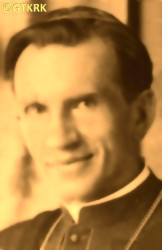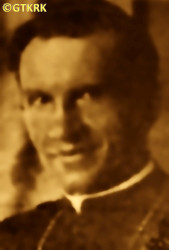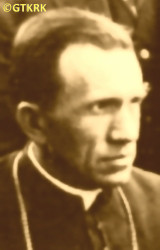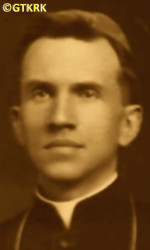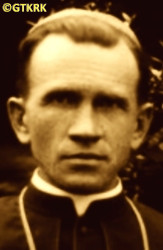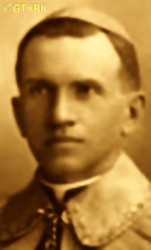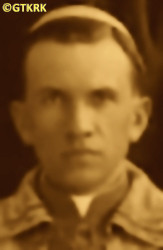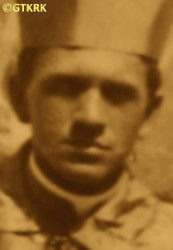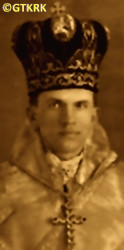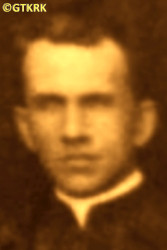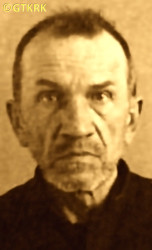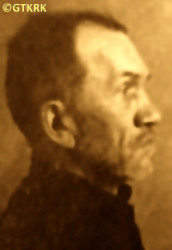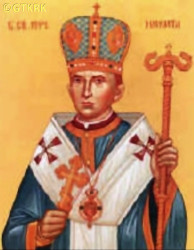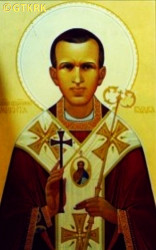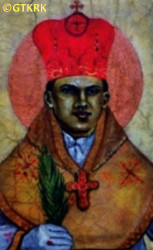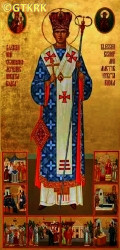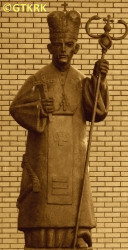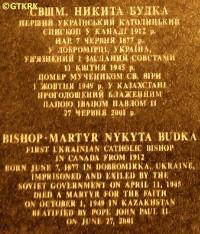Roman Catholic
St Sigismund parish
05-507 Słomczyn
85 Wiślana Str.
Konstancin deanery
Warsaw archdiocese, Poland
full list:
displayClick to display full list

searchClick to search full list by categories
wyświetlKliknij by wyświetlić pełną listę po polsku

szukajKliknij by przeszukać listę wg kategorii po polsku

Martyrology of the clergy — Poland
XX century (1914 – 1989)
personal data
religious status
blessed
surname
BUDKA
forename(s)
Nicetas
beatification date
27.06.2001more on
www.swzygmunt.knc.pl
[access: 2013.05.19]

the RC Pope John Paul IImore on
en.wikipedia.org
[access: 2014.09.21]
function
bishop
creed
Ukrainian Greek Catholic GCmore on
en.wikipedia.org
[access: 2013.05.19]
diocese / province
Lviv GC archeparchymore on
en.wikipedia.org
[access: 2013.05.19]
nationality
Ukrainian
date and place
of death
28.09.1949

ITL KarLagGuLAG slave labour camp network
today: Karazhar, Karaganda reg., Kazakhstan
more on
en.wikipedia.org
[access: 2019.10.13]
alt. dates and places
of death
01.10.1949
ITL KarLagGuLAG slave labour camp network
today: Staryi Zhartas / Kyzylzhar, Karaganda reg., Kazakhstan
more on
en.wikipedia.org
[access: 2019.10.13]
details of death
On 27.07.1914, after outbreak of the World War I, published a pastoral letter exhorting Canadian Ukrainians to return to homeland and fight of Austro–Hungarian side, against Russia.
After Canadian entry into the war — as a British dominium — branded as „enemy”.
Forbidden to leave Canada.
On 08.07.1918 arrested in Hafford village in Saskatchewan province.
For lack of evidence released.
Formally however cleared during a trial on 27.11.1919.
After German defeat at the end of the World War II started by German and Russian invasion of Poland in 09.1939, after start of another Russian occupation arrested by the Russians on 11.04.1945, together with all Greek Catholic bishops residing on pre‐war Polish territories.
For a year held Lyukyanivska prison in Kiev.
Incessantly interrogated and tortured.
On 29.05.1946 stood trial in front of Russian kangaroo court, accused of „crimes against Soviet Russia and Communist party”.
On 03.06.1945 sentenced to 5 years in Russian slave labour concentration camps, Gulag.
On 05.07.1946 transported to a camp in Karazhar village in Kazakhstan, part of ITL KarLag concentration camp.
A year later, on 14.10.1947, moved to camp's hospital in a place called Staryi Zhartas.
Perished in hospital or the camp itself.
cause of death
extermination
perpetrators
Russians
sites and events
ITL KarLagClick to display the description, GulagClick to display the description, Kiev (Lyukyanivska)Click to display the description, Ribbentrop‐MolotovClick to display the description, Pius XI's encyclicalsClick to display the description
date and place
of birth
07.06.1877

Dobromirkatoday: Zbarazh urban hrom., Ternopil rai., Ternopil obl., Ukraine
more on
en.wikipedia.org
[access: 2023.03.02]
parents
BUDKA Michael
🞲 ?, ? — 🕆 ?, ?

Mary
🞲 ?, ? — 🕆 1934, ?
presbyter (holy orders)
ordination
25.10.1905

Lvivtoday: Lviv urban hrom., Lviv rai., Lviv obl., Ukraine
more on
en.wikipedia.org
[access: 2022.01.16]
St George GC cathedral churchmore on
en.wikipedia.org
[access: 2018.09.02]
positions held
1912 – 1949
titular bishop — Patara RC diocese — appointment: on 15.07.1912; ordination: on 13.10.1912, St George archcathedral in Lviv
c. 1929 – 1945
Minor Canon — Lvivtoday: Lviv urban hrom., Lviv rai., Lviv obl., Ukraine
more on
en.wikipedia.org
[access: 2022.01.16] ⋄ Cathedral Chapter ⋄ St George GC archcathedral church
c. 1930 – 1945
vicar general — Lvivtoday: Lviv urban hrom., Lviv rai., Lviv obl., Ukraine
more on
en.wikipedia.org
[access: 2022.01.16] ⋄ Archeparchial Consistory (i.e. Curia)
from c. 1938
clerk — Lvivtoday: Lviv urban hrom., Lviv rai., Lviv obl., Ukraine
more on
en.wikipedia.org
[access: 2022.01.16] ⋄ Archeparchial Consistory (i.e. Curia)
from c. 1932
pro‐synodal examiner — Lvivtoday: Lviv urban hrom., Lviv rai., Lviv obl., Ukraine
more on
en.wikipedia.org
[access: 2022.01.16] ⋄ Archeparchial Consistory (i.e. Curia)
c. 1929 – c. 1932
dean — Lvivtoday: Lviv urban hrom., Lviv rai., Lviv obl., Ukraine
more on
en.wikipedia.org
[access: 2022.01.16] GC deanery
c. 1929 – c. 1932
parish priest — Lvivtoday: Lviv urban hrom., Lviv rai., Lviv obl., Ukraine
more on
en.wikipedia.org
[access: 2022.01.16] ⋄ St George GC archcathedral parish ⋄ Lvivtoday: Lviv urban hrom., Lviv rai., Lviv obl., Ukraine
more on
en.wikipedia.org
[access: 2022.01.16] GC deanery
1912 – 1928
apostolic exarch — Canada (Ukrainian) GC apostolic exarchate — appointment: on 15.07.1912; installed: 22.12.1912; resigned: on 09.11.1928
c. 1911 – 1912
clerk — Lvivtoday: Lviv urban hrom., Lviv rai., Lviv obl., Ukraine
more on
en.wikipedia.org
[access: 2022.01.16] ⋄ Archeparchial Consistory (i.e. Curia)
c. 1911 – 1912
advisor, secretary and clerk — Lvivtoday: Lviv urban hrom., Lviv rai., Lviv obl., Ukraine
more on
en.wikipedia.org
[access: 2022.01.16] ⋄ Archeparchy's Metropolitan Court ⋄ Lviv GC archeparchy
c. 1910 – 1912
editor — Lvivtoday: Lviv urban hrom., Lviv rai., Lviv obl., Ukraine
more on
en.wikipedia.org
[access: 2022.01.16] ⋄ „Emigrant” monthly
c. 1909 – 1912
membership — Lvivtoday: Lviv urban hrom., Lviv rai., Lviv obl., Ukraine
more on
en.wikipedia.org
[access: 2022.01.16] ⋄ St Paul the Apostle Society
c. 1909 – 1912
prefect — Lvivtoday: Lviv urban hrom., Lviv rai., Lviv obl., Ukraine
more on
en.wikipedia.org
[access: 2022.01.16] ⋄ philosophy and theology, Greek Catholic Theological Seminary
1907 – 1912
secretary — Lvivtoday: Lviv urban hrom., Lviv rai., Lviv obl., Ukraine
more on
en.wikipedia.org
[access: 2022.01.16] ⋄ St Raphael the Angel Society — charity organization to help Ukrainian economic emigration from Galicia and Bukovina; also: founder
till 1909
PhD student — Viennatoday: Vienna state, Austria
more on
en.wikipedia.org
[access: 2020.07.31] ⋄ theology, St Augustine Higher Scientific Institute for Diocesan Priests („Augustineum/Frintaneum”) — PhD thesis „The Discipline of the Greek Church in the Light of the Polemics in the Times of Photius”, not defended
1902 – 1905
student — Innsbrucktoday: Innsbruck‐Land dist., Tyrol state, Austria
more on
en.wikipedia.org
[access: 2024.03.19] ⋄ philosophy and theology, College (Canisianum), Jesuits SI
from 1902
student — Lvivtoday: Lviv urban hrom., Lviv rai., Lviv obl., Ukraine
more on
en.wikipedia.org
[access: 2022.01.16] ⋄ philosophy and theology, Greek Catholic Theological Seminary
c. 1902
student — Lvivtoday: Lviv urban hrom., Lviv rai., Lviv obl., Ukraine
more on
en.wikipedia.org
[access: 2022.01.16] ⋄ law, John Casimir University [i.e. clandestine John Casimir University (1941‐1944) / Ivan Franko University (1940‐1941) / John Casimir University (1919‐1939) / Franciscan University (1817‐1918)]
1901 – 1902
obligatory army service — Viennatoday: Vienna state, Austria
more on
en.wikipedia.org
[access: 2020.07.31] ⋄ Austro–Hungarian Imperial Army
1897 – 1900
educator — Bilche Zolotetoday: Bilche Zolote hrom., Chortkiv rai., Ternopil obl., Ukraine
more on
en.wikipedia.org
[access: 2022.08.05] ⋄ Sapieha's palace — children of Prince Paweł Jan Sapieha
others related
in death
CHAMCZUKClick to display biography Gregory, CZECHUTClick to display biography Paul, DOBRZAŃSKIClick to display biography Nicholas, SKLEPOWICZClick to display biography Basil, WASYLKIEWICZClick to display biography Mokiy, WERBOWIECKIClick to display biography Basil, ZARYCKIClick to display biography Alexander
sites and events
descriptions
ITL KarLag: Russian Rus. Исправи́тельно‐Трудово́й Ла́герь (Eng. Corrective Labor Camp) ITL Rus. Карагандинский (Eng. Karagandskiy) — concentration and slave forced labor camp (within the Gulag complex) — with headquarters in the city of Karaganda, Karaganda Oblast in Kazakhstan. Founded on 17.09.1931. One of the largest in the Gulag complex. It covered an area of 300 by 200 km, with its center in the Dolynka village, c. 45 km from Karaganda. One of the tasks was to grow food, especially animal husbandry, for the emerging centers of coal mining and heavy industry in Kazakhstan. Prisoners slaved in camp workshops (metal processing, drawing, tailoring), in the production of construction materials, in a glassworks, a sugar refinery, a vegetable drying plant, in coal mines, limestone mining, and in fishing. At its peak, c. 65,000 prisoners were held there: e.g. 45,798 (01.01.1943); 50,080 (01.01.1944); 53,946 (01.01.1945); 60,745 (01.01.1947); 63,555 (01.01.1948); 65,673 (01.01.1949); 54,179 (01.01.1950); 45,675 (01.01.1951). In total, c. 1,000,000 people passed through the camp, including many women and children. Many died. It ceased operations on 27.07.1959. (more on: en.wikipedia.orgClick to attempt to display webpage
[access: 2019.10.13])
Gulag: The acronym Gulag comes from the Rus. Главное управление исправительно‐трудовых лагерей и колоний (Eng. Main Board of Correctional Labor Camps). The network of Russian concentration camps for slave labor was formally established by the decision of the highest Russian authorities on 27.06.1929. Control was taken over by the OGPU, the predecessor of the genocidal NKVD (from 1934) and the MGB (from 1946). Individual gulags (camps) were often established in remote, sparsely populated areas, where industrial or transport facilities important for the Russian state were built. They were modeled on the first „great construction of communism”, the White Sea‐Baltic Canal (1931‐1932), and Naftali Frenkel, of Jewish origin, is considered the creator of the system of using forced slave labor within the Gulag. He went down in history as the author of the principle „We have to squeeze everything out of the prisoner in the first three months — then nothing is there for us”. He was to be the creator, according to Alexander Solzhenitsyn, of the so‐called „Boiler system”, i.e. the dependence of food rations on working out a certain percentage of the norm. The term ZEK — prisoner — i.e. Rus. заключенный‐каналоармец (Eng. canal soldier) — was coined in the ITL BelBaltLag managed by him, and was adopted to mean a prisoner in Russian slave labor camps. Up to 12 mln prisoners were held in Gulag camps at one time, i.e. c. 5% of Russia's population. In his book „The Gulag Archipelago”, Solzhenitsyn estimated that c. 60 mln people were killed in the Gulag until 1956. Formally dissolved on 20.01.1960. (more on: en.wikipedia.orgClick to attempt to display webpage
[access: 2024.04.08])
Kiev (Lyukyanivska): Russian political prison in Kiev, in the first half of 20th century run by the genocidal NKVD, informally referred to as prison No 1, formally as Investigative Prison No 13 (SIZO#13). It was founded in the early 19th century. In the 20th century, during the Soviet times, the prison church was transformed into another block of cells. During the reign of J. Stalin in Russia, more than 25,000 prisoners passed through it. (more on: en.wikipedia.orgClick to attempt to display webpage
[access: 2014.09.21])
Ribbentrop‐Molotov: Genocidal Russian‐German alliance pact between Russian leader Joseph Stalin and German leader Adolf Hitler signed on 23.08.1939 in Moscow by respective foreign ministers, Mr. Vyacheslav Molotov for Russia and Joachim von Ribbentrop for Germany. The pact sanctioned and was the direct cause of joint Russian and German invasion of Poland and the outbreak of the World War II in 09.1939. In a political sense, the pact was an attempt to restore the status quo ante before 1914, with one exception, namely the „commercial” exchange of the so‐called „Kingdom of Poland”, which in 1914 was part of the Russian Empire, fore Eastern Galicia (today's western Ukraine), in 1914 belonging to the Austro‐Hungarian Empire. Galicia, including Lviv, was to be taken over by the Russians, the „Kingdom of Poland” — under the name of the General Governorate — Germany. The resultant „war was one of the greatest calamities and dramas of humanity in history, for two atheistic and anti‐Christian ideologies — national and international socialism — rejected God and His fifth Decalogue commandment: Thou shall not kill!” (Abp Stanislav Gądecki, 01.09.2019). The decisions taken — backed up by the betrayal of the formal allies of Poland, France and Germany, which on 12.09.1939, at a joint conference in Abbeville, decided not to provide aid to attacked Poland and not to take military action against Germany (a clear breach of treaty obligations with Poland) — were on 28.09.1939 slightly altered and made more precise when a treaty on „German‐Russian boundaries and friendship” was agreed by the same murderous signatories. One of its findings was establishment of spheres of influence in Central and Eastern Europe and in consequence IV partition of Poland. In one of its secret annexes agreed, that: „the Signatories will not tolerate on its respective territories any Polish propaganda that affects the territory of the other Side. On their respective territories they will suppress all such propaganda and inform each other of the measures taken to accomplish it”. The agreements resulted in a series of meeting between two genocidal organization representing both sides — German Gestapo and Russian NKVD when coordination of efforts to exterminate Polish intelligentsia and Polish leading classes (in Germany called «Intelligenzaktion», in Russia took the form of Katyń massacres) where discussed. Resulted in deaths of hundreds of thousands of Polish intelligentsia, including thousands of priests presented here, and tens of millions of ordinary people,. The results of this Russian‐German pact lasted till 1989 and are still in evidence even today. (more on: en.wikipedia.orgClick to attempt to display webpage
[access: 2015.09.30])
Pius XI's encyclicals: Facing the creation of two totalitarian systems in Europe, which seemed to compete with each other, though there were more similarities than contradictions between them, Pope Pius XI issued in 03.1937 (within 5 days) two encyclicals. In the „Mit brennender Sorge” (Eng. „With Burning Concern”) published on 14.03.1938, condemned the national socialism prevailing in Germany. The Pope wrote: „Whoever, following the old Germanic‐pre‐Christian beliefs, puts various impersonal fate in the place of a personal God, denies the wisdom of God and Providence […], whoever exalts earthly values: race or nation, or state, or state system, representatives of state power or other fundamental values of human society, […] and makes them the highest standard of all values, including religious ones, and idolizes them, this one […] is far from true faith in God and from a worldview corresponding to such faith”. On 19.03.1937, published „Divini Redemptoris” (Eng. „Divine Redeemer”), in which criticized Russian communism, dialectical materialism and the class struggle theory. The Pope wrote: „Communism deprives man of freedom, and therefore the spiritual basis of all life norms. It deprives the human person of all his dignity and any moral support with which he could resist the onslaught of blind passions […] This is the new gospel that Bolshevik and godless communism preaches as a message of salvation and redemption of humanity”… Pius XI demanded that the established human law be subjected to the natural law of God , recommended the implementation of the ideal of a Christian state and society, and called on Catholics to resist. Two years later, National Socialist Germany and Communist Russia came together and started World War II. (more on: www.vatican.vaClick to attempt to display webpage
[access: 2023.05.28], www.vatican.vaClick to attempt to display webpage
[access: 2023.05.28])
sources
personal:
pl.wikipedia.orgClick to attempt to display webpage
[access: 2013.05.19]
original images:
risu.org.uaClick to attempt to display webpage
[access: 2019.12.26], zarubezhje.narod.ruClick to attempt to display webpage
[access: 2019.12.26], risu.org.uaClick to attempt to display webpage
[access: 2019.12.26], annalesecclesiaeucrainae.blogspot.comClick to attempt to display webpage
[access: 2019.12.26], annalesecclesiaeucrainae.blogspot.comClick to attempt to display webpage
[access: 2019.12.26], commons.wikimedia.orgClick to attempt to display webpage
[access: 2019.12.26], archbishopterry.blogspot.comClick to attempt to display webpage
[access: 2019.12.26], diasporiana.org.uaClick to attempt to display webpage
[access: 2020.02.01], annalesecclesiaeucrainae.blogspot.comClick to attempt to display webpage
[access: 2019.12.26], www.encyclopediaofukraine.comClick to attempt to display webpage
[access: 2019.12.26], skeparchy.orgClick to attempt to display webpage
[access: 2019.12.26], commons.wikimedia.orgClick to attempt to display webpage
[access: 2019.12.26], commons.wikimedia.orgClick to attempt to display webpage
[access: 2019.12.26], traditio.wikiClick to attempt to display webpage
[access: 2019.12.26], www.ugcc-in-russia.narod.ruClick to attempt to display webpage
[access: 2021.12.19], busycatholic.blogspot.comClick to attempt to display webpage
[access: 2019.12.26], annalesecclesiaeucrainae.blogspot.comClick to attempt to display webpage
[access: 2019.12.26], commons.wikimedia.orgClick to attempt to display webpage
[access: 2019.12.26], commons.wikimedia.orgClick to attempt to display webpage
[access: 2019.12.26]
LETTER to CUSTODIAN/ADMINISTRATOR
If you have an Email client on your communicator/computer — such as Mozilla Thunderbird, Windows Mail or Microsoft Outlook, described at WikipediaPatrz:
en.wikipedia.org, among others — try the link below, please:
LETTER to CUSTODIAN/ADMINISTRATORClick and try to call your own Email client
If however you do not run such a client or the above link is not active please send an email to the Custodian/Administrator using your account — in your customary email/correspondence engine — at the following address:

giving the following as the subject:
MARTYROLOGY: BUDKA Nicetas
To return to the biography press below:
 Click to return to biography
Click to return to biography








